Fitness trackers are a fantastic way to inform your workout programs with reliable data. While an argument can be made for just getting out there and running (or whatever exercise you perform), easy access to data can transform your training overnight. In this article, we will be looking at the six best fitness trackers that do not need a smartphone.
Fitness trackers are a way for you to create and store data about your daily lifestyle. Usually, they are used for measuring running performance, counting your daily steps, and keeping track of data such as weight, gender, age, etc.
Increasingly, fitness trackers are being used to help measure other areas of your lifestyle, such as your sleep quality, stress levels, heart health, and some even help you to keep a record of your calorie intake each day.
Most fitness trackers require you to sync them to your smartphone, there are many good reasons to do this, and most people are happy to do so. However, for some people, the idea of combining their smartphone and fitness tracker is off-putting.
Requiring a smartphone connection can be an issue, particularly if it means that you need to carry your smartphone around with you at all times to sync the data. Many people also don’t like the idea of having to spend time learning how to connect two devices, deal with bug fixes, and generally spend time on something that should be instantaneous.
Then there are compatibility issues. Some fitness trackers work better with certain smartphones than others. What happens if your ideal fitness tracker doesn’t work well with your current smartphone? In this article, we will be showcasing six fitness trackers that do not need a smartphone to operate.
What Benefits Do Fitness Trackers Offer?
There are two main benefits to using a fitness tracker. The first benefit is the most obvious, and that is that fitness trackers help to keep track of your progress. Be it your exercise performance, health statistics, sleep consistency, or your weight.
This tracking of statistics can give context to your current habits and goals. It can show you whether you are progressing or not and how well you are doing. If three weeks ago you were walking 4,000 steps per day, and today you are averaging 6,000 steps, then you can see that progress.
Fitness trackers also help to keep you motivated. Something that should not be underestimated when it comes to fitness. Knowing how far you have come or how far you need to go can be highly motivating.
A 2022 meta-analysis found that wearable technology led to increased physical activity, improved body composition, and improved fitness. The study found that people walked, on average, an extra 1,800 steps per day when wearing fitness trackers.
Fitness Trackers That Do Not Need a Smartphone
Our findings have been compiled and analyzed to provide an accurate evaluation of various fitness trackers available in the market. We have taken into consideration various factors such as accuracy, design, features, and customer feedback to rate each tracker.
The results of our analysis have been summarized here for your convenience. However, for a more comprehensive understanding, we have also included an in-depth analysis of the best trackers in the market.
The following six fitness trackers are all able to be operated without requiring the use of a smartphone. For each tracker, we will examine the features they offer, the value for money, and the pros and cons of choosing it.
Garmin VivoActive 4 GPS Smartwatch
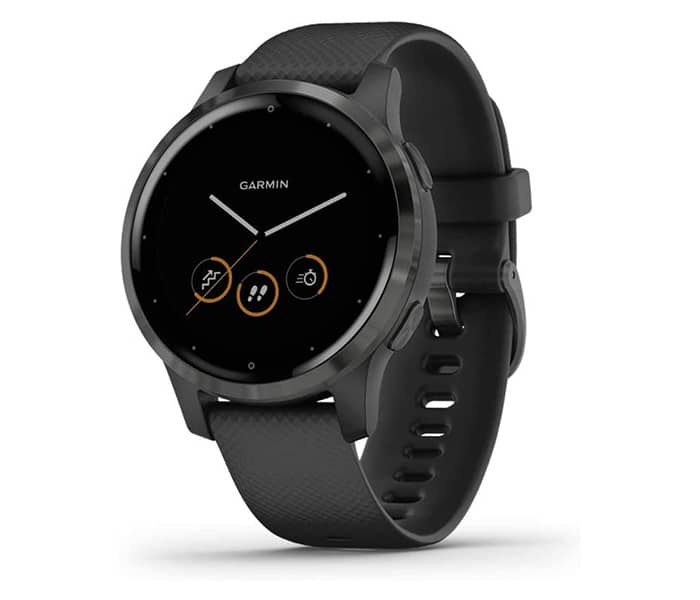
Garmin makes some of the nicest fitness trackers on the market, and the Garmin VivoActive 4 GPS Smartwatch is no exception.
Features:
- 8-hour battery life
- GPS mode
- Download music and connect with headphones.
- Preloaded workouts help you exercise.
- Measures energy levels, stress, sleep, and heart rate
The battery can last for eight hours when in smartwatch mode and six hours when in GPS mode. This makes it fairly useless for wearing as an actual watch, but if you are using it for exercise or long hikes, it is perfect.
The watch can be synced with your phone, but it is perfectly capable of being used without ever syncing them together. In fact, it was designed for people who wanted to go on runs without the need for their phones.
The exercise animations that are preloaded onto your watch can really help you when you go to the gym, and this is a fascinating bit of technology. Most fitness trackers tend to ignore resistance training (weights and machines). It can also be used to pay for items, and you can sync it with your computer if you want to store more data.
The battery life is a little underwhelming. It should go without saying that any form of smartwatch should be able to be used as a watch for at least a full day, but aside from that, this is a seriously good fitness tracker.
AmazFit GTS Fitness Smartwatch
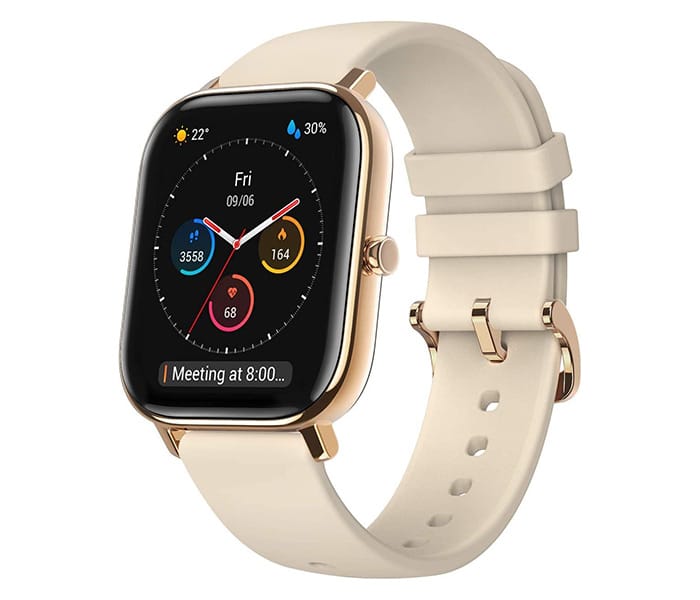
With this fitness smartwatch, you may be forgiven for wondering whether you will ever need a smartphone again in your life! This fitness tracker comes from Amazon itself, and this has helped keep the costs down.
Features:
- 14-day battery life
- 5 ATM water resistant
- Bluetooth music
- GPS
- 1.65-inch screen
- Heart rate, step counter, calorie tracker
The battery life of the AmazFit GTS Fitness Smartwatch absolutely blows the competition out of the water. 14 days is very impressive and so helpful. It means that you can wear it all day and sleep with it on so that it can measure your sleep quality without having to charge it constantly.
The fitness tracker has decent water resistance, making it suitable for swimming pools, but perhaps not deep sea diving! It also records your swim efficiency, distance, and calories burned, making it ideal for anyone who swims regularly.
The fitness tracker tracks 12 sports modes, including outdoor running, walking, cycling (indoor and outdoor), treadmill, swimming, and skiing. There are many apps that you can download, and this really feels like a complete alternative to owning a phone.
Garmin Forerunner 245 Music
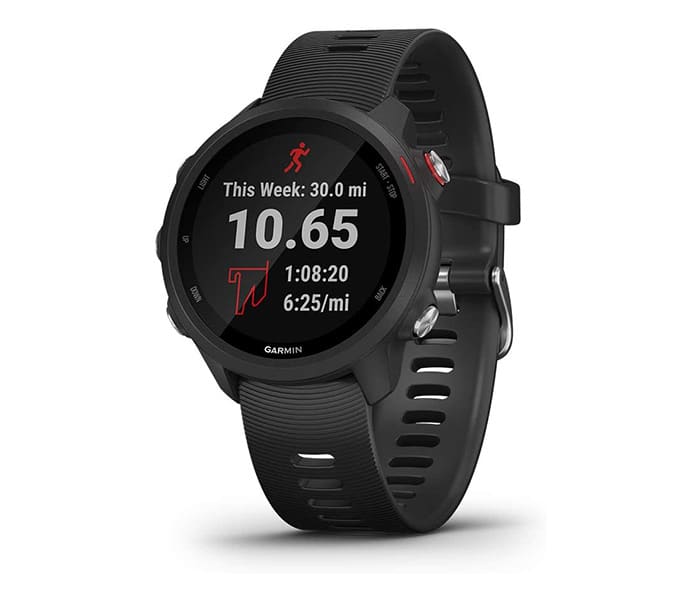
The Garmin Forerunner 245 Music is an excellent fitness tracker and one that is particularly good for long-distance runners or hikers. Its ability to measure running dynamics makes it invaluable for the amateur runner who wants to analyse their running efficiency.
Features:
- 7-day battery life
- GPS
- Training programs
- Running analysis
- Sync to music streaming services
If you really love your running, then getting your running style analysed can be really helpful. However, this requires a running coach and a lot of money. Alternatively, the Garmin Forerunner 245 Music can measure your running dynamics. It measures your ground contact time, your stride length, and vertical ratio, helping you to adjust your technique and improve your running performance.
One very interesting feature of this fitness tracker is incident detection. This feature recognises when you have fallen over or been in an accident, and it can be used to contact the relevant service. However, this feature requires a smartphone (to call the service), so it’s not quite in the spirit of this review.
The battery is excellent, and as with most Garmin fitness trackers, the GPS and battery are decent. The training software and running analysis help this fitness tracker to stand out from the crowd.
Garmin VivoSmart 5
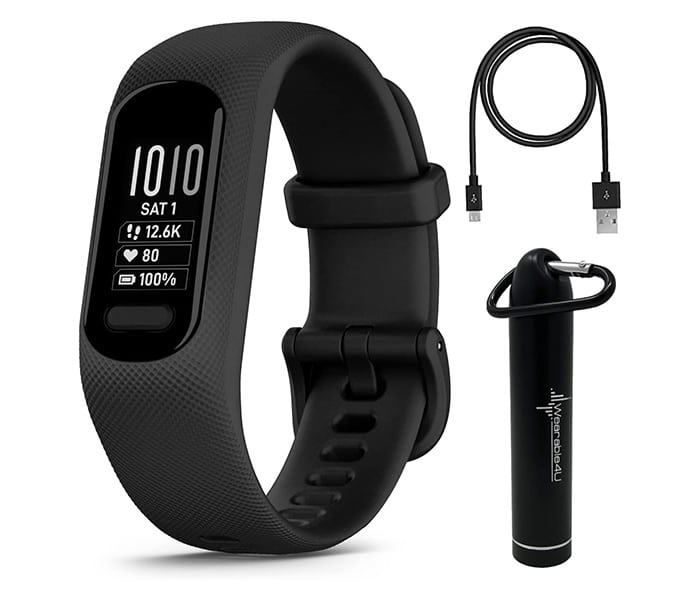
While the first three fitness trackers on this list could also be described as smartwatches, the Garmin VivoSmart 5 is the first pure fitness tracker on this list. While the screen can be quite hard to read at times, the compact size offers several benefits when exercising and during sleep.
Features:
- 7-day battery
- Monitors respiration, energy, hydration, HR, and stress.
- Step tracking, calorie counting, training intensity.
- Sleek, lightweight design, perfect for exercise
One of the criticisms aimed at the Garmin VivoSmart 5 is the lack of GPS, which is certainly a shame. But the great design, low price, and excellent battery life more than make up for this. If you really want a fitness tracker that is independent of smartphones and simple to use, then this could well be the fitness tracker for you.
The tracker is extremely comfortable, and unlike many fitness trackers, it doesn’t draw attention to itself. This is a simple, no-thrills fitness tracker that does its job well.
Samsung Galaxy Watch 5
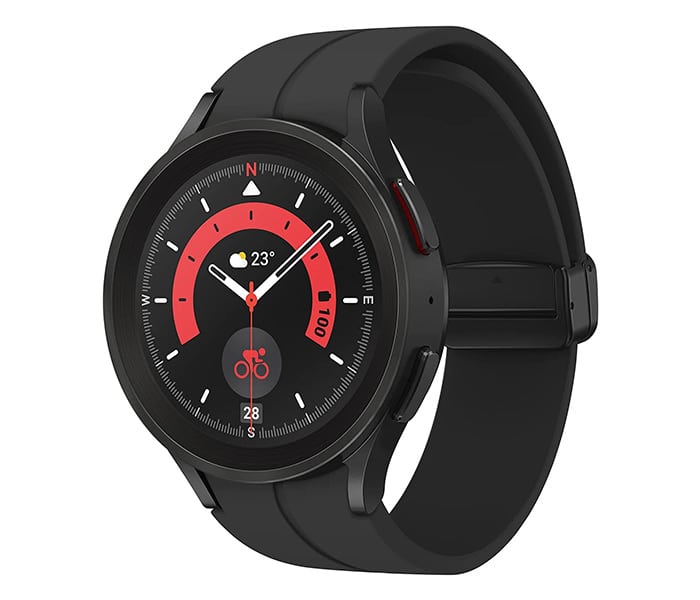
If you are looking for a fitness tracker that is effective yet also absolutely beautiful to behold, then the Samsung Galaxy Watch 5 should be on your radar. Yes, the Samsung Galaxy is a smartphone, but it is 100% possible to use the Samsung Galaxy Watch 5 without a smartphone.
Features:
- 3-day battery life
- Aesthetically pleasing
- Body Composition Analysis
- Automatic workout tracking
- GPS route tracking
- Sleep coaching
Let’s be clear. The Samsung Galaxy Watch 5 is not cheap. It represents a significant investment. But if you have the budget for it, you will own the best fitness tracker and smartwatch in town. The only downside, other than the price, is the battery life. Three days is decent but could be better.
The fitness tracker is absolutely gorgeous to behold, with a lovely colour scheme and a beautiful watch face. The sleep coaching is supreme, helping you to analyse each night and find out your sleep patterns and quality.
The body composition analysis tool isn’t going to be particularly accurate, but few are. The heart rate sensor is excellent, and this data can help inform your body composition analysis. The durability of the fitness tracker is legendary, with sapphire crystal glass and a titanium case helping your tracker to survive even the most arduous of exercise sessions.
SUUNTO 9 Baro
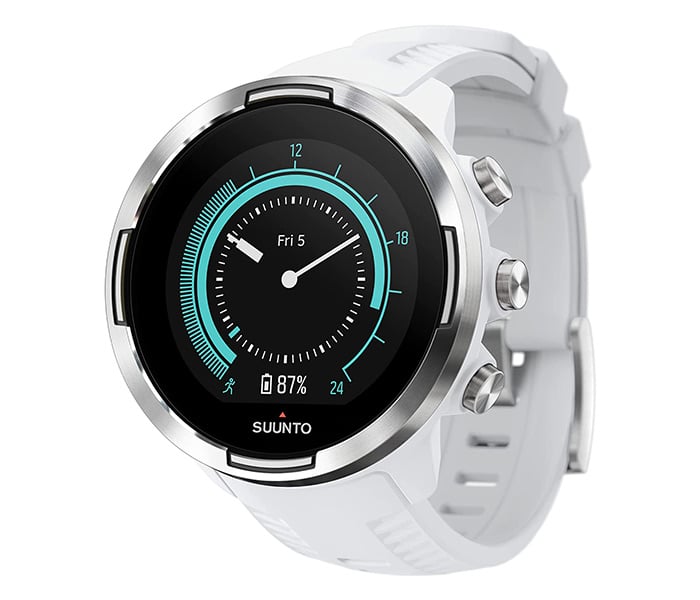
The final fitness tracker on this list is the Suunto 9 Baro, another beautiful yet expensive smartwatch that offers you everything you need without the need for a smartphone. With excellent water resistance, a powerful battery, and effective GPS, this is the ideal fitness tracker.
Features
- Battery up to 170 hours of training
- GPS
- Highly durable design
- Training analysis and guidance for a number of sports
- Water resistant up to 100 metres
- Stunning design
- Barometer gives you accurate altitude information.
As with the previous fitness tracker on this list, the Suunto 9 Baro represents a serious investment, but for your money you are getting a smartwatch with a difference. These watches have a long and proud history of making watches that are perfect for hiking, mountaineering, and climbing. This means that the watchmakers know how to make a watch that will survive even the most intense workouts.
But this is so much more than a beautiful smartwatch. The Suunto 9 Baro has incredibly effective GPS, offers training analysis and guidance for several sports, and is water resistant up to 100 metres. Perfect for open water swimming and caving.
The screen is beautifully designed, and it makes it easy for you to read out the information that it presents. No need for a smartphone, but you have the option to sync it to your CPU or phone if you want to store more data.
Which Tracker is Best Suited for Seniors?
There are several fitness trackers on this list that are excellently suited for seniors. The last two are great for seniors, though expensive. Our pick is the Garmin Forerunner 245 Music. It is a reasonable price, has the technology to recognise a dangerous fall or accident, and they are easy to use.
Key Features to Look Out For When Choosing a Fitness Tracker
Here are four features that you should be looking out for when researching your ideal fitness tracker, particularly when you want one that does not need a smartphone.
Battery Life
Battery life is crucial, and there are many amazing fitness trackers that didn’t make this list because their battery is so poor. You don’t want a fitness tracker that won’t last longer than 3 hours without charging. Ideally, you want one that can last weeks without charging. That way you can get your entire life tracked 24/7, for the most accurate results.
GPS Capability
GPS isn’t crucial unless you plan on running or hiking outdoors a lot, in which case it really is helpful. We’ve included one fitness tracker that doesn’t have GPS, but the others all do because this is an excellent feature.
Data Storage
The more data that your fitness tracker can hold, the more accurate the measurements and analysis they offer is. Remember, you can always sync your fitness tracker to a computer, that way all of your data is easily accessible. But many people will find that their fitness tracker is more than capable of holding enough data to give them amazing feedback.
Accuracy
What is the point of measuring calories, body fat, step count, or heart rate, if your fitness tracker isn’t accurate? Accuracy is crucial for any fitness tracker or smartwatch that wants to dominate the market.